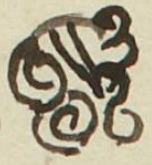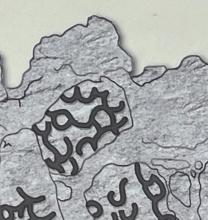Tecuicuil (MH647v)
This black-line drawing of the compound glyph for Tecuicuil ("Varied in Color" or “Painted Stone”) is attested here as a man's name. It shows a stone (tetl), fairly horizontal, with a curling right end and two stripes across its middle. On the left end of the stone and below it are curling symbols that refer perhaps to cuicuiltic, something painted and often with multiple colors.
Stephanie Wood
The tetl appears to be a phonetic indicator for the start of the name. Tecuicuiltic, a dictionary word, does not necessarily have anything to do with stones. That said, the archaeological site of Cuicuilco has painted stones, and they are decorated with squiggly lines that resemble this and other glyphs for just Cuicuil.
Marc Thouvenot identifies the verb icuiloa (or ihcuiloa, with the glottal stop), which means to paint, write, or print, as having a root of -cuil-. He notes how it also appears in tlacuiloliztli (writing), tlacuilo (writer), and cuicuiltic (mottled). He goes on to show various uses of icuiloa that take it beyond the simple definitions just given, resulting in something like the action of creating a design (e.g., on leather, ceramics, sculpture, or in textiles). It can also be something like the action of decorating (e.g., to put a flower on a cup of atole). He associates icuiloa and tlacuilolli with "cultural artifacts," such as arts and crafts or examples of writing and painting, but cuicuiltic with effects created by "nature." This short summary barely does his article justice; it is worth reading the entire piece. How Thouvenot's study might connect with the concept of bent or curved mentioned by Prem (1974: 555, 682) raises an interesting question. Perhaps the bent or curved lines of writing, painting, carving, embroidery, and so on, fall with in the realm of expressions of -cuil-. See
Marc Thouvenot, "Imágenes y escritura entre los nahuas del inicio del XVI," Estudios de Cultural Náhuatl 41 (2010).
Stephanie Wood
Anto tecuicuil
Antonio Tecuicuil
Stephanie Wood
1560
Jeff Haskett-Wood
multicolored, de muchos colores, piedras, pintar, pinturas, escrituras, escribir, remolinos, nombres de hombres
This drawing of the red lines that are painted on stones at the Cuicuilco archaeological site seems to capture something of the tecuicuiltic concept (painted stone). Credit: INAH signage at the site of what Byron Cummings called a temazcalli, outside the round pre-Classic pyramid. (SW)

te(tl), stone, https://nahuatl.wired-humanities.org/content/tetl
cuicuiltic, something painted or spotted, https://nahuatl.wired-humanities.org/content/cuicuiltic
tecuicuiltic, varied in color, https://nahuatl.wired-humanities.org/content/tecuicuiltic
De Muchos Colores
Stephanie Wood
Matrícula de Huexotzinco, folio 647r, World Digital Library, https://www.loc.gov/resource/gdcwdl.wdl_15282/?sp=377&st=image
This manuscript is hosted by the Library of Congress and the World Digital Library; used here with the Creative Commons, “Attribution-NonCommercial-ShareAlike 3.0 License” (CC-BY-NC-SAq 3.0).









